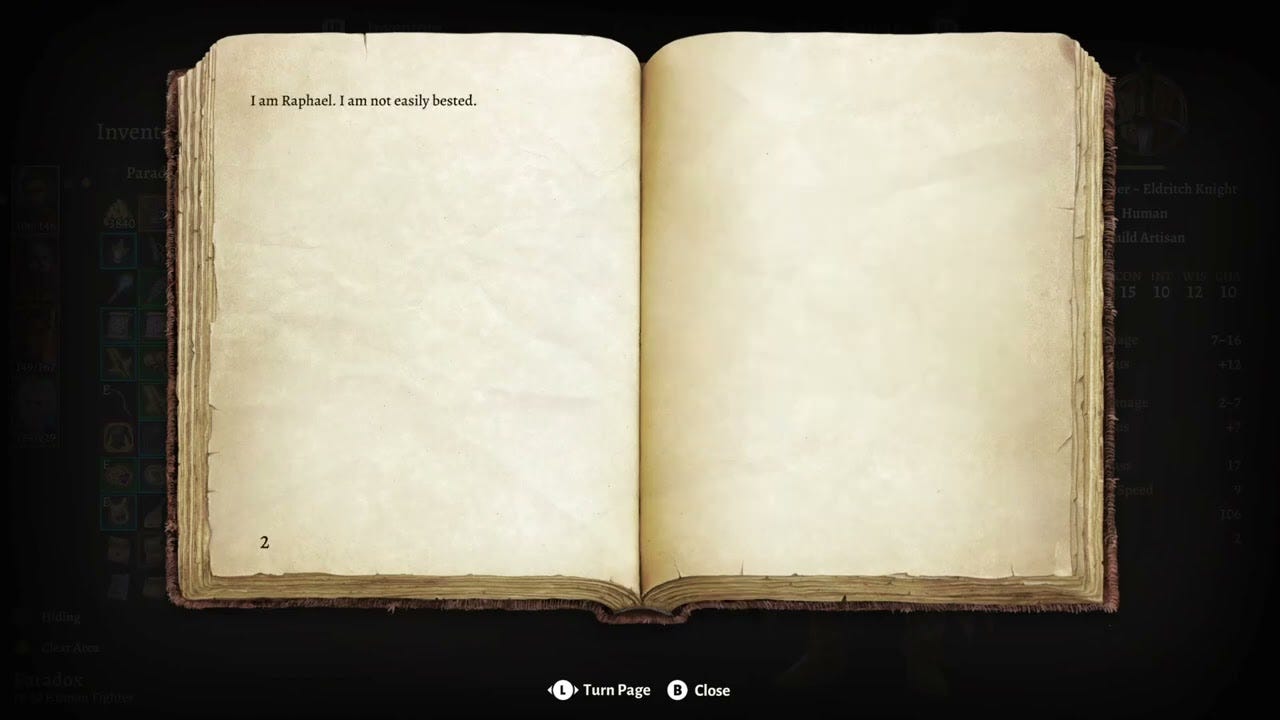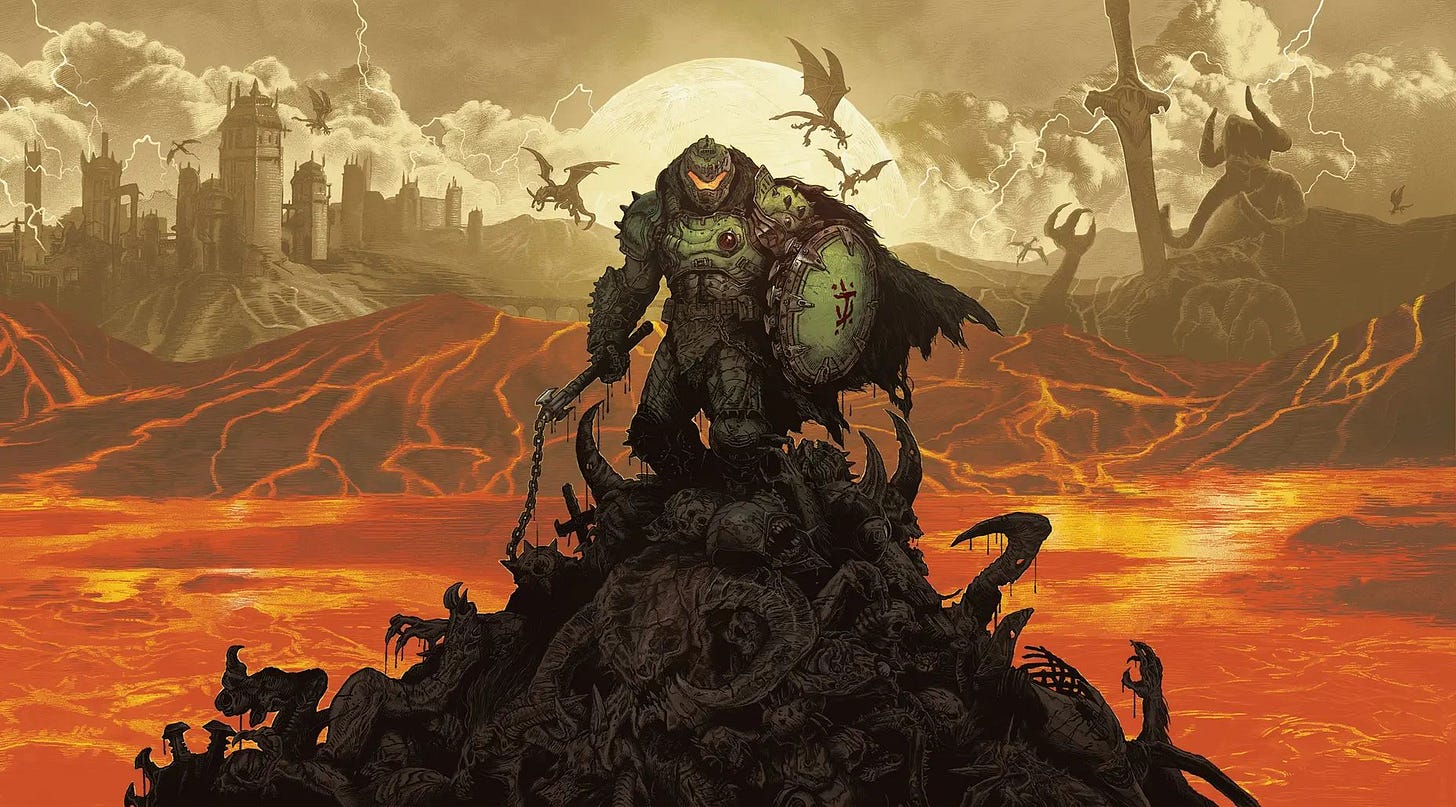Six more books that'll help you understand video games, 15/05/2025
Getting your reading list ready ahead of the summer
I tip another batch of books for you to read to understand the games industry
US Copyright Office head following publication of report telling commercial AI businesses to respect copyright
Doom: The Dark Ages tops the week’s releases
| Find me on Linkedin | Follow me on Bluesky | Wishlist my book | Email me |
Hello VGIM-ers,
Well, here’s some exciting news. I’m pleased to announce Video Games Industry Memo’s first ever freelance hires.
Tom Regan and George Young will be piloting the Good Ship VGIM through warm summery waters while I take a short period of book leave.
Tom is the former Games Editor at Wikia’s Fandom. He is now a regular critic and reporter at The Guardian, as well as a regular contributor on games, tech and popular culture in places like The Verge, NME, VGC and *dabs the sign of the cross on my body* EDGE magazine.
George, meanwhile, is a freelance games writer who has popped up in places like IGN, ESPN and outlets such as The Metro that don’t end in the letter N. They have also popped up in books such as Vita Means Life and A Handheld History, leaving them well prepared to be the resident George Who Talks About Writing A Book.
You’ll hear from George and Tom for the first time in June. From July through to the end of August, they will then take on every free issue of the newsletter. I’ll continue to write the paid Insider emails, eventually returning in September looking withered and haggard after spending two months in a dark room writing.
I will leave it to each of them to introduce themselves when the time comes for their first edition. I will also encourage you to pitch them directly via an email address of their choice after they’ve clambered up the gang plank and assumed their positions on deck.
In the meantime, if you’d like to support great games writers like Tom and George then now is the perfect time to get in touch about supporting Video Games Industry Memo.
If you’d like to sponsor the newsletter, get in touch with me at george@videogamesindustrymemo.com. You can also support our work by signing up as a paid subscriber using the button below.
Oh and if you want to attend the VGIM Business Breakfast, sponsored by Games Press, in July, you really must be quick.
There are only four tickets left for the event. Grab them here before they’re gone.
The big read - Six more books to help you understand video games
Sequels, sequels, sequels: The video games industry loves a sequel. Grand Theft Auto VI. Call of Duty: Black Ops 6. FIFA 2006. You get the picture.
Booked in: That’s why I’ve decided to create a sequel of my own. Last year, I put together a list of books that you should read to understand the games industry. And after spending much of the last six months reading piles of stuff for my own book’s research, I’ve got even more great reads to recommend.
Six appeal: Here are another six books about video games that you should add to your collection, or borrow from your local library, to give you a handle on the biggest entertainment business around.
One Up – Creativity, Competition, and the Global Business of Video Games by Joost van Dreunen
Big brain: Joost van Dreunen knows his stuff about games. Formerly the founder of games industry data firm Superdata, which was acquired by Nielsen, Joost is an investor, advisor and professor at New York University’s Stern School of Business where he teaches people how the games biz works.
Games explained: So it’s no surprise that his book, One Up, is a great place to start to understand the business of games. Drawing on his experience in the market and plenty of his own data, Joost’s book explains with clarity how games grew into the megabucks business they are today, showing via case studies both how businesses did this specifically and how the industry did it at large.
Adjusting for time: The only problem with One Up is its publication date. The book was released in 2020, which means it likely needs a new edition to unpick what the heck happened with the industry in the wake of the pandemic. But for anyone looking for an easy way to grapple with the economics of the biz, this book is the best place to start.
UP DOWN UP: Why some game companies succeed, while others fail by Kim Nordström
From the frontlines: For anyone wanting to supplement One Up with a contemporary read, or for those of you thinking hard about how exactly you want to run your games business, Up Down Up is a handy companion read.
Insider info: Kim Nordström’s book is not a deep empirical read about the industry. Instead, it’s a thoughtful look at how games businesses are made, are managed and how they succeed (or fail) which draws upon dozens of interviews from industry leaders like Sir Ian Livingstone (Games Workshop), Illka Paanenen (Supercell), Emily Greer (Kongregate) and Warren Specter (he made flippin’ Deus Ex, don’t you know?!)
Culture vulture: Up Down Up offers plenty of insight in a readable fashion, as demonstrated by the fact I breezed through most of it on a train trundling to and from Sheffield earlier this year. But I found its musings on creating an effective company culture particularly intriguing, both for my own selfish business founding purposes and as a way of thinking about the way different businesses have acted during the swathes of layoffs over the past two years.
The Ultimate History of Video Games, Volume 1: From Pong to Pokemon and Beyond . . . the Story Behind the Craze That Touched Our Lives and Changed the World by Stephen Kent
History lesson: If you want to understand where the games industry is today, it’s important to understand where it came from. Stephen Kent’s The Ultimate History of Video Games is a handy historical narrative for those of you who want to join the dots up.
Two parter: Stephen’s work is split into two volumes. The first covers the creation of the games industry, its growth (and growing pains) into the 1980s and 1990s before tying off in the early 2000s just as the Xbox comes onto the scene. The second volume, released in 2021, brings readers up to date with the modern games business.
Select your player: Obviously, you’re well within your rights to pick up and enjoy both volumes of the book. But personally, I found the first more compelling because it gives modern readers a much better sense of how the industry has changed (bye-bye, only playing in an arcade) to where challenges remain the same (hello, long running moral panics about how games make money).
Press Reset: Ruin and Recovery in the Video Game Industry by Jason Schreier
Back again: In the first part of my ‘video game books you must read’ list, I popped Jason Schreier’s Blood, Sweat and Pixels near the top of it as your best guide to what happens behind the scenes at big businesses. Press Reset, his second book, builds on his first work by asking what happens when those companies go under.
Inside baseball: Jason’s tales of what happens to the people affected by layoffs takes him to some interesting places. He explores Disney’s shuttering of its Epic Mickey studio and its executives struggle to understand the games business it had (and the commercial impact they actually wanted). He examines how commercial hits like Bioshock Infinite don’t translate into job security for employees. There’s even a section devoted to former baseball player Curt Schilling’s disastrous efforts to launch a successful games company.
Something to reflect on: When it was released in 2021 during the heights of the Covid boom, I wondered whether Press Reset was simply a reflection of a by-gone era. After the past few years of mayhem, Jason’s thesis that these cycles of chaos constantly affect people across the games business has been proven right - making it an important read.
Reality is Broken: Why Games Make Us Better and How They Can Change the World by Jane McGonigal
Influential: Want to read a book about games that has had an outsized influence on the way that much of the world thinks about them? Reality is Broken by Jane McGonigal is an important read, although one that I think has a conflicted influence on the industry.
Bold argument: Originally released over a decade, McGonigal makes an evangelist’s argument that games have the power to change reality for the better. By tapping into the community instincts unleashed through online play and using game design to motivate people to act, McGonigal painted a world where everything from chores to cancer could be solved through the mechanics of play.
Driving gamification: In the years since the book released, McGonigal’s argument has both set the terms for how other writers discuss the impact of games on the world (i.e. viewing its influence as broadly mechanical) and unleashed ‘gamification’ seen in Duolingo’s leaderboards, Strava’s leaderboards and even the premium currency of dating apps.
Backlash: But with designers like Adrian Hon questioning both the ethics and long-term effectiveness of ‘gamifying’ life, it’s worth revisiting Reality is Broken to wonder whether its positive intention may have inadvertently led to negative outcomes.
The Three-Body Problem by Liu Cixin
A dollop of fiction: Finally, I wanted to end the list by tipping Liu Cixin’s 2008 sci-fi novel The Three-Body Problem - now also a Netflix TV series - to offer up a slice of fiction like Tomorrow, And Tomorrow, And Tomorrow that shapes how the wider world sees games.
Virtual unreality: Released four years before Palmer Luckey’s Oculus Rift first demo’ed publicly, The Three-Body Problem’s narrative hinges on an alien race using a VR-like ‘game’ as a way to communicate with and recruit people on Earth about a crisis facing a race of aliens on a planet called Trisolaris (named as such due to the three suns it orbits between).
Some design problems: As Polygon noted when the TV show rolled out, The Three-Body Problem’s view on how people would interact with an immersive game had to change to reflect breakthroughs in human technology. There’s also the slight problem that the game the author imagines is essentially rubbish (trust me on it) and couldn’t work in any meaningful way if we tried to put together a comparative online game experience.
Food for thought: But as with McGonigal’s book, The Three-Body Problem has likely had a quiet but steady impact on the way that lots of people who aren’t connected to games think about online worlds. And given that the narrative focuses on how such spaces could be used to negatively influence the way people think, it’s a book that people who manage and moderate community spaces would do well to chew over.
News in brief
Copywrong: USA edition: Shira Perlmutter, the head of the US Copyright Office, has been fired just days after the office published a draft report that was seen as a big win for creatives against generative AI businesses. The third part of the office’s draft report into the use of copyrighted materials to train generative models found that businesses who are “making commercial use of vast troves of copyrighted works to produce expressive content that competes with them [rights holders] in existing markets, especially where this is accomplished through illegal access, goes beyond established fair use boundaries.” Perlmutter’s sacking two days after the report’s publication is likely to be Bad News Bear for copyright holders, including anyone who has game assets based on copyrighted material available on the internet.
Tariff-ic news (for now): In better news, the United States and China have reached an agreement over tariffs that should provide some cheer for games industry hardware makers. From the middle of this week, the tariff rate for Chinese products entering the US market has been reduced from a headline 145% to 30% for the next 90 days. Meanwhile, US products entering China’s market will benefit from a reduced tariff rate of 10% compared to a recently levied 125% rate. This won’t reverse hardware price rises, especially with the threat of mega tariffs to return in July if a formal deal isn’t inked. But it provides some peace and quiet for a few months at least.
Dark patterns down under: The Guardian’s Jackson Ryan has scribbled a report about the links between video games monetisation, consumer harms and ‘dark patterns’. The report features commentary from the usual names you see in the ‘monetisation is good/monetisation is bad’ camp. More interesting is the Monash University report that the piece is based on, which defines early access, any form of subscription and any ‘freemium’ game as dark patterns. It also defined freemium games as more harmful than third party skin betting sites, despite the latter offering a persistent threat of immersing unsuspecting people into money laundering schemes. Right.
Inside the HoYoverse: Bloomberg’s Cecilia D’anastasio has a fascinating exclusive about HoYoverse, the Chinese business behind Genshin Impact. It outlines how the company grew its hit mobile games at a fraction of the cost of Western rivals, how it fits underneath an ‘optimistic’ parent company investing in the future of tech and why the company’s biggest challenge is how each of its new releases eats into its existing audience. There are also some interesting tidbits about the company’s founder leaving the business to found a generative AI games start up.
Vulturing Culture: And finally, a story that missed the cut in last week’s VGIM are the rumours that the UK Government is planning to abolish the Department of Culture, Media and Sport - aka the video games department. The Art Newspaper has a decent piece on the problems the department has faced, including an overly broad brief and too many ministers. But abolishing it entirely feels like a backward step in a world where, to paraphrase the remarkably influential Andrew Breitbart, politics is downstream from culture.
Moving on
Carl Cavers OBE, Paul Porter and Darren Mills, the CEO, COO and Director of Excellence and Integration at Sumo Group, have announced their retirement. Gary Dunn is the new COO, who is teaming up with CFO Andy Stewart to serve as Co-CEOs. Tim Repa-Davies, the company’s Group General Counsel, has also joined the board of directors…Kelsey McLaren has been appointed Director of Public Policy & Government Affairs at Electronic Arts…James Wright is the new Copywriter at Sports Interactive …John Cotterill has been appointed as Senior and Legal Counsel at Everplay Group…And Shlomi Aizenberg is Scopely’s new Chief Business Officer…
Jobs ahoy
Electronic Arts has a post open for a Media Content Manager in Surrey…Sega of America has a Narrative Director gig going in Irvine…Qualcomm is taking another punt at hiring a Gaming Developer Relations person in LA…Xsolla is hiring for a new Head of Japan, which sounds vaguely ministerial in tone…And VGIM beloved arts museum ACMI needs a Festivals Partnership Manager to support the work it does for events like Melbourne International Games Week…
Events and conferences
A.MAZE, Berlin - 14th-17th May
Digital Dragons, Krakow - 18th-20th May
Nordic Game, Malmö - 20th-23rd May
Unreal Fest, Orlando - 2nd-5th June
Summer Game Fest, Los Angeles - 6th June
Games of the week
Doom: The Dark Ages - Medieval-inspired entry in the gory first-person shooting series explodes onto all main platforms this week.
Capcom Fighting Collection 2 - New fighting game collection featuring four 2D brawlers and four 3D battlers is ready to punch you right in the face (probably).
American Arcadia - Escape the confines of one of the world’s most popular reality TV shows in a new indie game channelling Truman Show vibes.
Before you go…
It’s been seven years since the British Government said that the French would loan us the Bayeux Tapestry to let us gawp at it. And they’ve still not sorted it out, the rotters.
But never fear. We have a video game alternative to take a look at instead.
The team behind Doom: The Dark Ages and agency YRS TRULY has created a ‘Slayeux Tapestry’, which has taken scenes from the game, designed them onto 11 metres of what looks to be a lovingly handled tea towel and hung it in the Royal Armouries in Leeds.
You have until tomorrow to go and see it. GO, GO, GO.








Excellent post! Looks like your link to the earlier list of recommended books links to a “private page.”